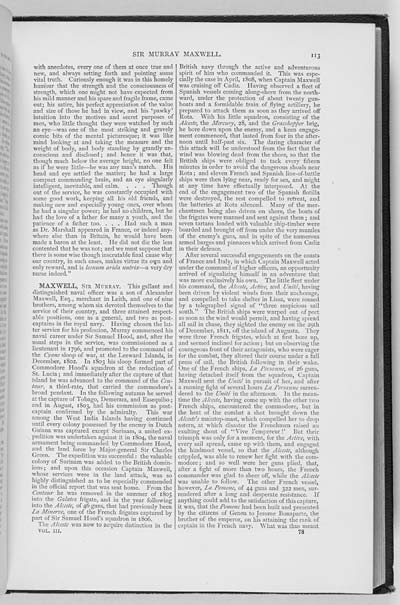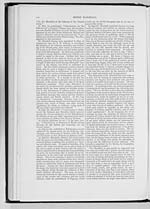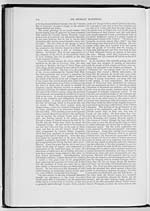113
with anecdotes, every one of them at once true and
new, and always setting forth and pointing some
vital truth. Curiously enough it was in this homely
humour that the strength and the consciousness of
strength, which one might not have expected from
his mild manner and his spare and fragile frame, came
out; his satire, his perfect appreciation of the value
and size of those he had in view, and his 'pawky'
intuition into the motives and secret purposes of
men, who little thought they were watched by such
an eye�was one of the most striking and gravely
comic bits of the mental picturesque; it was like
mind looking at and taking the measure and the
weight of body, and body standing by grandly un-
conscious and disclosed; and hence it was that,
though much below the average height, no one felt
as if he were little�he was any man's match. His
head and eye settled the matter; he had a large
compact commanding brain, and an eye singularly
intelligent, inevitable, and calm. . . . Though
out of the service, he was constantly occupied with
some good work, keeping all his old friends, and
making new and especially young ones, over whom
he had a singular power; he had no children, but he
had the love of a father for many a youth, and the
patience of a father too. . . . Had such a man
as Dr. Marshall appeared in France, or indeed any-
where else than in Britain, he would have been
made a baron at the least. He did not die the less
contented that he was not; and we must suppose that
there is some wise though inscrutable final cause why
our country, in such cases, makes virtue its own and
only reward, and is leonum arida nutrix�a very dry
nurse indeed."
MAXWELL, SIR MURRAY. This gallant and
distinguished naval officer was a son of Alexander
Maxwell, Esq., merchant in Leith, and one of nine
brothers, among whom six devoted themselves to the
service of their country, and three attained respect-
able positions, one as a general, and two as post-
captains in the royal navy. Having chosen the lat-
ter service for his profession, Murray commenced his
naval career under Sir Samuel Hood, and, after the
usual steps in the service, was commissioned as a
lieutenant in 1796, and promoted to the command of
the Cyane sloop of war, at the Leeward Islands, in
December, 1802. In 1803 his sloop formed part of
Commodore Hood's squadron at the reduction of
St. Lucia; and immediately after the capture of that
island he was advanced to the command of the Cen-
taur, a third-rate, that carried the commodore's
broad pendant. In the following autumn he served
at the capture of Tobago, Demerara, and Essequibo;
and in August, 1803, had his commission as post-
captain confirmed by the admiralty. This war
among the West India Islands having continued
until every colony possessed by the enemy in Dutch
Guiana was captured except Surinam, a united ex-
pedition was undertaken against it in 1804, the naval
armament being commanded by Commodore Hood,
and the land force by Major-general Sir Charles
Green. The expedition was successful: the valuable
colony of Surinam was added to the British domin-
ions; and upon this occasion Captain Maxwell,
whose services were in the land attack, was so
highly distinguished as to be especially commended
in the official report that was sent home. From the
Centaur he was removed in the summer of 1805
into the Galatea frigate, and in the year following
into the Alceste, of 46 guns, that had previously been
La Minerve, one of the French frigates captured by
part of Sir Samuel Hood's squadron in 1806.
The Alceste was now to acquire distinction in the
VOL. III.
British navy through the active and adventurous
spirit of him who commanded it. This was espe-
cially the case in April, 1808, when Captain Maxwell
was cruising off Cadiz. Having observed a fleet of
Spanish vessels coming along-shore from the north-
ward, under the protection of about twenty gun-
boats and a formidable train of flying artillery, he
prepared to attack them as soon as they arrived off
Rota. With his little squadron, consisting of the
Alceste, the Mercury, 28, and the Grasshopper brig,
he bore down upon the enemy, and a keen engage-
ment commenced, that lasted from four in the after-
noon until half-past six. The daring character of
this attack will be understood from the fact that the
wind was blowing dead from the shore, so that the
British ships were obliged to tack every fifteen
minutes in order to avoid the dangerous shoals near
Rota; and eleven French and Spanish line-of-battle
ships were then lying near, ready for sea, and might
at any time have effectually interposed. At the
end of the engagement two of the Spanish flotilla
were destroyed, the rest compelled to retreat, and
the batteries at Rota silenced. Many of the mer-
chantmen being also driven on shore, the boats of
the frigates were manned and sent against them; and
seven tartans loaded with valuable ship-timber were
boarded and brought off from under the very muzzles
of the enemy's guns, and in spite of the numerous
armed barges and pinnaces which arrived from Cadiz
in their defence.
After several successful engagements on the coasts
of France and Italy, in which Captain Maxwell acted
under the command of higher officers, an opportunity
arrived of signalizing himself in an adventure that
was more exclusively his own. The little fleet under
his command, the Alceste, Active, and Unite, having
been driven by violent winds from their anchorage,
and compelled to take shelter in Lissa, were roused
by a telegraphed signal of "three suspicious sail
south." The British ships were warped out of port
as soon as the wind would permit, and having spread
all sail in chase, they sighted the enemy on the 29th
of December, 1811, off the island of Augusta. They
were three French frigates, which at first bore up,
and seemed inclined for action; but on observing the
courageous front of their antagonists, who were eager
for the combat, they altered their course under a full
press of sail, the British following in their wake.
One of the French ships, La Persanne, of 26 guns,
having detached itself from the squadron, Captain
Maxwell sent the Unite in pursuit of her, and after
a running fight of several hours La Persanne surren-
dered to the Unite in the afternoon. In the mean-
time the Alceste, having come up with the other two
French ships, encountered the commodore, but in
the heat of the combat a shot brought down the
Alceste's maintop-mast, which compelled her to drop
astern, at which disaster the Frenchmen raised an
exulting shout of "Vive l'empereur!' But their
triumph was only for a moment, for the Active, with
every sail spread, came up with them, and engaged
the hindmost vessel, so that the Alceste, although
crippled, was able to renew her fight with the com-
modore; and so well were her guns plied, that,
after a fight of more than two hours, the French
commander was glad to sheer off, while the Alceste
was unable to follow. The other French vessel,
however, La Pomone, of 44 guns and 322 men, sur-
rendered after a long and desperate resistance. If
anything could add to the satisfaction of this capture,
it was, that the Pomone had been built and presented
by the citizens of Genoa to Jerome Bonaparte, the
brother of the emperor, on his attaining the rank of
captain in the French navy. What was thus meant
78

![]() Universal Viewer |
Universal Viewer | ![]() Mirador |
Large image | Transcription
Mirador |
Large image | Transcription
![]()

